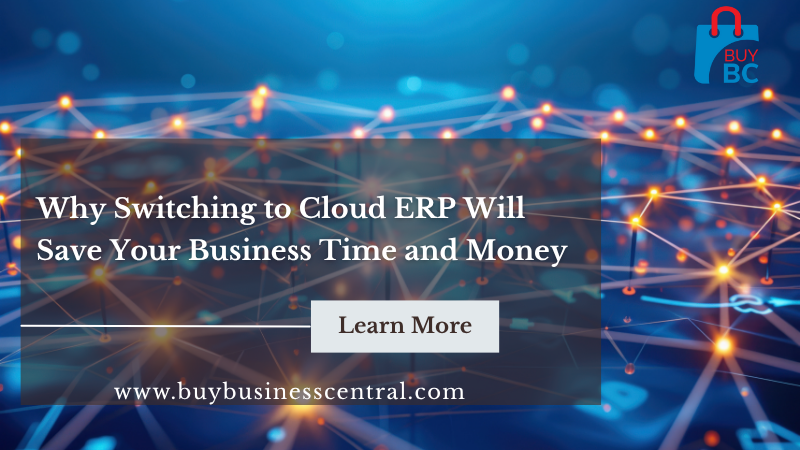
Are you a business owner constantly looking for ways to cut costs, increase efficiency, and get a better handle on your company’s financial health? If your business is still relying on fragmented software, outdated spreadsheets, or a legacy on-premise Enterprise Resource Planning (ERP) system, you are very likely spending far more time and money than you need to. The digital age has introduced a powerful, transformative Cloud ERP solution.
For small to mid-sized businesses (SMBs), the phrase “enterprise-grade software” once brought to mind images of massive upfront investments, dedicated IT teams, and months of disruptive implementation. That is no longer the case. Modern Cloud ERP solutions like Microsoft Dynamics 365 Business Central have made this technology available to everyone, making sophisticated business management accessible, affordable, and agile.
This article will explain exactly how moving to the cloud can be one of the most strategic financial and operational decisions you make this year. We’ll explore the key cloud ERP benefits, answer the question, 'Is cloud ERP worth it?', and show you exactly how to save money with Cloud ERP.
What is Cloud ERP?
Before diving into the benefits, it’s important to understand what Cloud ERP is.
Cloud ERP is an enterprise resource planning (ERP) software hosted on remote servers and accessible via the internet, typically delivered on a subscription basis as Software-as-a-Service (SaaS).
Unlike traditional on-premise ERP, which is installed and run on servers located in your company's physical data center and managed by your internal IT staff, Cloud ERP is hosted on the vendor's secure servers. You and your employees access the system anytime, anywhere, using a web browser and an internet connection.
This fundamental difference in deployment model is the source of all the enormous time and cost savings.
1. Major Cost Reduction: How to Save Money with Cloud ERP
The most immediate and quantifiable reason to ask why switch to Cloud ERP is the dramatic reduction in the Total Cost of Ownership (TCO). For business owners, predictable expenses are a huge advantage, and the cloud model delivers just that.
Eliminating Upfront Capital Expenditure (CapEx)
Traditional ERP requires massive initial investment for:
- Hardware: Purchasing servers, network equipment, and dedicated storage.
- Software Licenses: Large, one-time, perpetual software licensing fees.
- Infrastructure Setup: Installation, configuration, and building out a secure server room.
A Cloud ERP solution flips this model completely. You move from capital expenditure to a predictable, operational expense (OpEx) with a monthly or annual subscription fee. This frees up crucial working capital that can be reinvested into growth-driving activities like sales, marketing, or product development.
Reducing Ongoing IT and Maintenance Costs
Once an on-premise system is deployed, the costs do not stop. You are responsible for everything from power consumption to disaster recovery. Cloud ERP eliminates these burdens entirely:
- No Hardware Maintenance: The vendor manages all server, storage, and networking hardware.
- Lower IT Staffing Needs: You no longer need a large, specialized in-house team dedicated to simply maintaining the system. Your existing IT staff can focus on strategic business projects, not routine upkeep.
- Updates and Upgrades Included: Traditional ERP upgrades are costly, disruptive projects that can take weeks or months. With Cloud ERP, updates, security patches, and new features are rolled out automatically by the vendor, included in your subscription, and happen seamlessly with minimal to zero downtime. This is one of the most powerful cloud ERP benefits that drastically saves both money and time.
2. Unlocking Time Savings and Operational Efficiency
Time is money. The operational efficiencies gained by moving to a modern Cloud ERP are often even more impactful than the direct cost savings. These systems are designed to eliminate manual effort and streamline workflows across the entire organization.
Automation and Integrated Workflows
One of the greatest cloud ERP benefits is the ability to centralize data and automate core processes. Instead of staff manually transferring data between disconnected systems (like accounting software, inventory management, and CRM), the Cloud ERP provides a single source of truth.
- Financial Close: Automation accelerates the financial close process from weeks to days, freeing up your finance team for more valuable analysis.
- Order-to-Cash: Processes like sales order entry, invoicing, and revenue recognition are automated, speeding up cash flow and minimizing human error.
- Procure-to-Pay: Automated approval workflows and matching invoices to purchase orders drastically reduce processing time and ensure cost control.
Real-Time Data and Faster Decision-Making
Fragmented data is slow data. A Cloud ERP centralizes all operational, financial, and customer data, providing decision-makers with real-time insights through intuitive dashboards. This immediate access to accurate information saves time on reporting and analysis, allowing you to react quickly to market changes.
For example, you can instantly check inventory levels, outstanding receivables, or sales performance across different regions without waiting for multiple departments to compile weekly spreadsheets. This speed and clarity is invaluable for strategic planning and answering, definitively, the question, is cloud ERP worth it? The value of better, faster decisions alone often justifies the investment.
Enhanced Accessibility and Collaboration
In today’s hybrid and remote work environment, accessibility is a necessity, not a luxury. Because Cloud ERP is accessed via the internet, your team can securely:
- Work Anywhere: Employees can manage operations, process orders, and view data from any location on any device.
- Collaborate Seamlessly: Sales, finance, and operations teams all work with the same, up-to-the-minute data, eliminating data silos and increasing cross-departmental efficiency. This reduction in communication lag and data reconciliation saves countless hours every month.
3. Future-Proofing Your Business with Scalability and Innovation
A common pain point with legacy on-premise systems is a lack of flexibility. As your business grows, these systems become bottlenecks, requiring costly, disruptive overhauls. Modern Cloud ERP software like Microsoft Dynamics 365 Business Central is built for agility.
Seamless Scalability
Cloud ERP is inherently scalable. Whether you are adding new users, launching a new product line, expanding into a new market, or experiencing seasonal spikes in demand, the system can instantly scale up or down to meet your needs. You simply adjust your subscription, avoiding the need to purchase and install new physical infrastructure.
Continuous Innovation
The best Cloud ERP software providers are constantly innovating. They build next-generation technologies like Artificial Intelligence (AI), Machine Learning (ML), and sophisticated analytics, including AI assistants like Copilot, right into the core of their platform. Since updates are automatic, your business gains immediate access to these cutting-edge tools without the heavy lifting of an in-house IT project. This ensures your business always remains competitive and agile.
Choosing the Best Cloud ERP Software: A Strategic Decision
When considering why switch to Cloud ERP, it is vital to choose a platform that is robust, flexible, and specifically designed for SMB growth. This is where solutions like Microsoft Dynamics 365 Business Central excel.
For businesses looking for a truly modern, unified platform that integrates finance, sales, service, and operations, Buy Business Central offers a best Microsoft Dynamics 365 Business Central solution. Microsoft’s Cloud ERP - Microsoft Dynamics 365 Business Central is known for its:
- Deep Integration: Seamlessly works with Microsoft 365 (Office, Teams) and the entire Dynamics 365 suite.
- Industry-Leading Security: Leverages Microsoft’s massive investment in cloud security and compliance.
- Global Scalability: Easily supports multi-currency and multi-entity operations as your business expands internationally.
Choosing a proven, highly-rated platform is the first step toward realizing all the time and money savings we have discussed. Contact us to explore solutions designed for forward-thinking businesses.
Don't Delay: Why the time to modernize your business with Cloud ERP is now
The decision to move to Cloud ERP is no longer a question of "if," but "when." The costs and time burdens associated with maintaining outdated, fragmented, or on-premise systems are simply unsustainable in a competitive market. The move to the cloud provides:
- Predictable, Lower Costs: Eliminating massive CapEx and reducing IT overhead.
- Unrivaled Efficiency: Automating core processes and providing a single source of truth.
- Future Resilience: Enabling seamless scalability and continuous access to innovation.
To start your journey toward a more profitable and efficient business, the time for action is now. Don’t let outdated technology continue to drain your resources.
Ready to start saving time and money with the power of Cloud ERP?
Contact us today at sales@buybusinesscentral.com to discuss how a modern Cloud ERP solution can transform your business.
FAQ: People Also Ask About Cloud ERP
Q1: Is Cloud ERP more secure than on-premise ERP?
Yes, in most cases. Leading Cloud ERP providers invest significantly more in cybersecurity, compliance, and disaster recovery than individual SMBs can afford. They employ full-time security experts, use advanced encryption, and provide built-in data backup, making your data more secure and resilient against threats.
Q2: How long does it take to implement Cloud ERP compared to traditional ERP?
Implementation for Cloud ERP is significantly faster. Traditional on-premise deployments can take 12 to 24 months due to hardware procurement, installation, and extensive customization. Cloud deployments are often completed in 3 to 9 months, depending on complexity, as the infrastructure is already in place and the focus is on configuration, not costly customization.
Q3: How much money can my small business expect to save by switching to Cloud ERP?
Savings are highly dependent on the size and current IT spending of your business, but they are substantial. Businesses typically realize savings through: 1) eliminating hardware and maintenance costs, 2) reducing IT overhead, and 3) efficiency gains from automation (fewer errors, faster processes). Many studies estimate TCO savings of 20-50% over a 5-year period compared to an equivalent on-premise system.
Q4: Which is the best Cloud ERP software for a growing mid-sized business?
While the "best" depends on specific industry needs, Microsoft Dynamics 365 Business Central is consistently ranked as one of the top choices. It offers a comprehensive, scalable, and highly integrated suite of capabilities perfect for growing SMBs who want full ERP functionality without the complexity.


 NB Projects
NB Projects  NB Procure
NB Procure  NB Assets
NB Assets  NB Quality
NB Quality  NB Payroll
NB Payroll  NB PDC Manager
NB PDC Manager  NB India GST
NB India GST  NB Credits
NB Credits  NB Procure B2B Marketplace Connector
NB Procure B2B Marketplace Connector  NB Scheduler
NB Scheduler 



